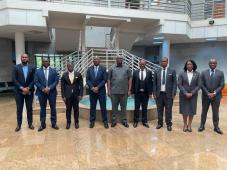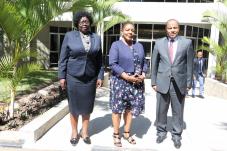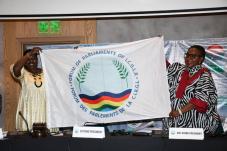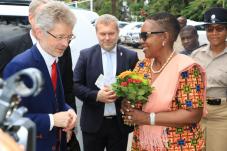NATIONAL ASSEMBLY OF ZAMBIA
LUSAKA
SPEECH BY HON. JUSTICE DR PATRICK MATIBINI, SC, MP, SPEAKER OF THE NATIONAL ASSEMBLY OF ZAMBIA DURING THE OFFICIAL OPENING CEREMONY OF THE 134TH ASSEMBLY OF THE INTER-PARLIAMENTARY UNION (IPU), ON 19TH MARCH, 2016 AT GOVERNMENT COMPLEX, LUSAKA
• Your Excellency the President of the Republic of Zambia, Mr. Edgar Chagwa Lungu
• Her Honour the Vice President of the Republic of Zambia, Mrs Inonge Wina, MP
• Your Excellency the President of the Inter-Parliamentary Union, Mr. Saber Chowdhury
• Hon. Speakers and Deputy Speakers of Member Parliaments here present
• Hon. Deputy Speaker of the National Assembly of Zambia, Mr. Mkhondo Lungu, MP
• Hon Deputy Chairperson of Committees of the Whole House of the National Assembly of Zambia, Mr. Chifumu Banda, SC, MP
• Cabinet Ministers here present,
• Honourable Members of Parliament,
• The Clerk of the National Assembly of Zambia and President of the Association of Secretaries-General of Parliament, Mrs Doris Mwinga
• Your Excellency the Secretary General of the Inter-Parliamentary Union, Mr Martin Chungong
• Madam Amina Mohammed, Special Advisor of the United Nations Secretary-General
• Your Excellences Members of the Diplomatic Corp
• Members of the Press
• Distinguished invited Guests
• Ladies and Gentlemen
On behalf of the National Assembly of Zambia and, indeed, on my own behalf, I welcome you all to Lusaka for the 134th Assembly of the Inter-Parliamentary Union (IPU). Allow me to thank the Governing Council of IPU for the honour extended to Zambia to host this important Assembly here in Lusaka.
Your Excellency the President, Ladies and gentlemen,
We all agree that a strong and efficient parliament is essential to our countries’ democratic development and IPU has continued to work towards making parliaments more effective in fulfilling their government oversight and legislative roles. Parliaments, when well supported and enabled, serve an important role of guaranteeing people’s rights and liberties and in securing peace and development.
Your Excellency the President, Ladies and gentlemen,
The Theme of this Assembly is: “Rejuvenating democracy, giving Voice to Youth.” This theme provides yet another opportunity for us gathered here to harness our collective resolve and energies to facilitate young people realise their full potential towards meaningfully participating in the social, economic and political developments of our respective countries. The innovative potential of young men and women in the fields of science, technology and structural transformation of our economies is immense and has been recognized in many countries. But to effectively tap these energies, the youths in our societies require supportive policy environments that aim to fully engage them in more productive engagements and away from undesirable pursuits such as drug abuse, crime and political militancy. Often times, we look at the youths as sources of discomfort when they begin to vent their concerns on our leaderships especially when they believe their interests are not well represented, let alone recognized. Youth unemployment, for example, has been a major global challenge and has often pushed young people to engage in less than honourable activities. High youth unemployment in many of our countries is caused by a number of factors not excluding the reality that young people are not acquiring the skills or experience needed to drive our economies forward and rarely offer them the requisite skills to sustain their livelihoods. Unemployed young people, often without college education, tend to be less skilled and inexperienced.
Your Excellency the President, Ladies and gentlemen,
The role of employment creation in averting the scourge of world poverty globally has been recognised globally and the youth have been targeted in more meaningful ways than before. In 2007, for example, the United Nations revised its MDG framework to include four new targets. Among these was a new target on Employment. Under MDG 1, one of the targets sought to achieve full and productive employment and decent work for all, including women and young people.
The role of the youth in democratic development should also not be underrated. Their role in challenging the status quo, when better informed and well-directed, could infuse our democratic dispensations with fresh and desirable perspectives. In this regard, given the right stimulus, today’s youth would transform into tomorrow’s leaders who, through effective participation, would rejuvenate our democratic institutions. By directing their energies towards worthwhile pursuits, the youth are capable of bringing about tangible benefits that would contribute towards our meeting the goals set out in the 2030 Agenda for Sustainable Development.
Your Excellency the President, Ladies and gentlemen,
While the youth hold the huge potential to meaningfully contribute to national and global development, significant barriers to their direct participation has persisted in many of our countries. The IPU report just launched here in Lusaka during the IPU Global Conference of Young Parliamentarians has revealed chronic under-representation of young people in world’s parliaments. The Report reveals that only 1.9 per cent of the world’s 45,000 parliamentarians are aged below 30 despite the reality that, according to UN figures, people that are aged between 20 - 44 years constitute close to 60 percent of the world’s voters. Even more revealing, the average age of the global population presently stands at 29.6 years, a further rationale for the urgent need for us all to deeply reflect on the current demographic realities in our choice of parliamentarians.
Your Excellency the President, Ladies and gentlemen,
In the light of these realities, a conscious and affirmative resolve needs to be made by our political leaderships to champion the cause towards increased representation by the more youthful members of our societies in our legislative systems. This may begin with political parties adopting more youths for parliamentary contestation. It is noteworthy that the IPU report has also revealed that young women face what it calls “a double layer of inequality” in parliamentary representation – because they are both young and because they are women. I am glad to inform you that, here in Zambia, our Republican President here present, has championed calls for the adoption of more women in the upcoming general elections later in the year. I am pleased to inform you, our distinguished guests, that our President, His Excellency Mr. Chagwa Lungu, has publicly declared that he will choose a woman as his running mate for the August 2016 presidential elections.
As I conclude, Your Excellency, Ladies and Gentlemen,
The Inter-Parliamentary Union has already taken note of the challenges of youth under-representation in parliaments. In 2010, as you may all recall, IPU addressed several of these issues in the context of its famous resolution on Youth Participation in the Democratic Process, which called upon countries to adopt targeted action on enhancing the political participation of the youth in a way that exemplified the interconnectedness of human rights, gender equality and social equity. The IPU’s Forum of Young Parliamentarians is actually one of the outcomes of that IPU Resolution. Still, a lot still needs to be done and this Meeting is yet another opportunity for us gathered here to identify what further actions are required. This is yet another opportunity for us to, among other things, showcase and share innovative experiences, ideas and initiatives as informed by our respective lived experiences and good practices. This would truly lead to the rejuvenation of democracy in our countries and should contribute to the enabling the youth possess a more audible voice in the democratic processes of our countries.
Your Excellency, Ladies and Gentlemen,
I look forward to fruitful deliberations and I thank you.




